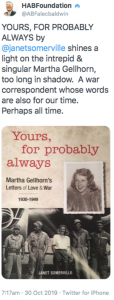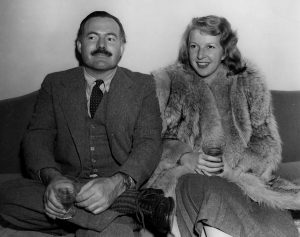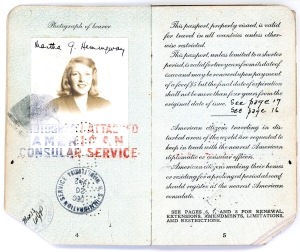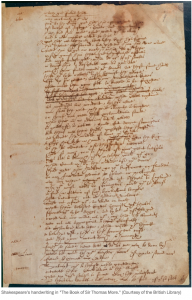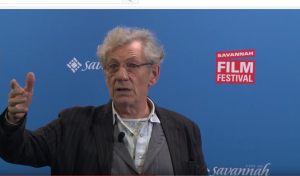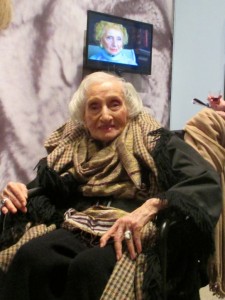Sold to Penguin Random House Audio: Yours, for Probably Always: Martha Gellhorn’s Letters of Love & War, 1930-1949 by Janet Somerville
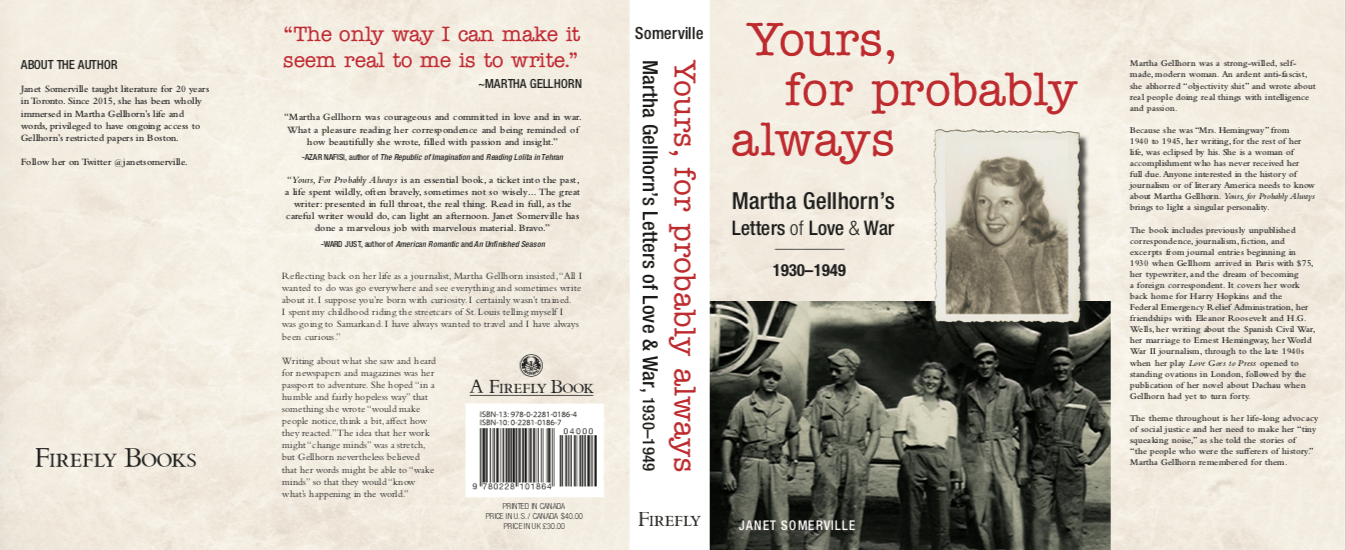 I’m excited to announce a deal I’ve made for a major new audiobook to be published on May 18 2021 by Penguin Random House Audio for Toronto writer Janet Somerville’s widely praised book Yours, for Probably Always: Martha Gellhorn’s Letters of Love & War, 1930-1949 (Firefly Books, hardcover 2019). Tony Award-winning actress Ellen Barkin*, a Gellhorn enthusiast and admirer of Somerville’s book, will be the voice of the audio edition. You can pre-order the audiobook via this link.
I’m excited to announce a deal I’ve made for a major new audiobook to be published on May 18 2021 by Penguin Random House Audio for Toronto writer Janet Somerville’s widely praised book Yours, for Probably Always: Martha Gellhorn’s Letters of Love & War, 1930-1949 (Firefly Books, hardcover 2019). Tony Award-winning actress Ellen Barkin*, a Gellhorn enthusiast and admirer of Somerville’s book, will be the voice of the audio edition. You can pre-order the audiobook via this link.
As with photojournalist Ruth Gruber** (1911-2016), Gellhorn (1908-1998, b. St Louis), was a trailblazer in her field. From the pitch letter I sent to acquiring editor Megan Mills at Penguin Random House Audio:
Journalist. Pioneer. Feminist. Human rights advocate.
Martha Gellhorn was all of these and more, leaving her role as wife of Ernest Hemingway a lesser light among many noteworthy milestones. Rendered sensitively here by Janet Somerville in a curated collection of letters braided together with a biographical narrative threaded through the correspondence, Yours, for Probably Always brings readers into Gellhorn’s life and career shaped by her combat reporting, all spanning the Depression, the Spanish Civil War, WWII, the refugee crisis following the aftermath of the war and the Holocaust, and the Cold War. Somerville also highlights Gellhorn’s friendships, her lovers, and a life lived intentionally.
Gellhorn’s work speaks to our times; she was a champion of the poor and dispossessed, a vocal critic of war and brutality, and a warrior against oppression. Her weapons were her pen and her words. Her circle included Gary Cooper, Dorothy Parker, Sylvia Beach, Colette, John Dos Passos, Ingrid Bergman, Lauren Bacall, Adlai Stevenson, and Robert Capa, a dear friend. Among her regular correspondents reflected in this collection were Leonard Bernstein; Eleanor Roosevelt; H.G. Wells; Maxwell Perkins; Charles Scribner; US General James Gavin, a high-profile critic of America’s War in Vietnam, and a romantic partner to Gellhorn; French philosopher Bertrand de Jouvenel; and of course, Hemingway.
Along with the letters, the book includes examples of Gellhorn’s journalism, fiction, and excerpts from her journals. An ardent anti-fascist, Gellhorn was a life-long advocate of social justice and a strong-willed, self-made modern woman. Yours, for Probably Always shines a light on this intrepid reporter and fearless figure.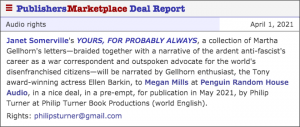
The reception for Yours, for Probably Always
When the hardcover edition was published it carried glowing endorsements from Ward Just and Azar Nafisi, seen on the book jacket above, receiving wide coverage and superb reviews, including a starred Kirkus; coverage in the Guardian, where it was their Book of the Day; the NY Review of Books; and some Twitter love from actor Alec Baldwin:
- “Somerville makes an impressive book debut with a life of novelist, journalist, and intrepid war correspondent Martha Gellhorn, told through a captivating selection of her letters to friends, family, husbands, and lovers. The volume is enriched by Somerville’s biographical narrative and her decision to include responses of many recipients and, in some cases, letters between individuals who were especially significant in Gellhorn’s life… An engrossing collection that burnishes Gellhorn’s reputation as an astute observer, insightful writer, and uniquely brave woman.”—Kirkus Reviews, a starred review
- “It’s history as it was lived, and shared in intimate emotional detail… Curated with valuable context by Janet Somerville… her own love letter of sorts to a woman she calls ‘a wonder.’”—Lyse Doucet, Guardian Books,
- “Martha Gellhorn was many things, including a novelist and short story writer, but a ‘relator of Wars”’ is the most important of them. . . . As early as 1935, her regular correspondent Allen Grover wrote to Gellhorn that ‘I should one day publish your collected letters. They’re magnificent prose.’ They are—and they are also precious traces of the turbulent, passionate, relentless, self-examined inner life of a woman of honor whose indomitable character is beautifully summed up by her mother in Somerville’s invigorating collection: ‘She lacks everything that makes living easy, she possesses most things that make it worthwhile.’”—Fintan O’Toole, New York Review of Books
- The CBC radio program Day 6 aired a feature on Somerville’s book which explained,
“Though [Gellhorn’s] dispatches from Normandy and Spain, which documented a mother’s grief after her child was killed by a bomb, brought humanity to tragedy for years, it was a report on Dachau…that made her famous. ‘My personal war aim was to get into Dachau,’ Gellhorn [said] in a 1983 TV interview. ‘I did get there and I was there the day the war ended. I didn’t have to be objective, in the sense that what was there to be objective about? It was a total and absolute horror and all I did was report it as it was.'”
Janet Somerville and Ellen Barkin
Somerville learned of Barkin’s interest in Gellhorn in 2019 when she offered to send the actor a copy of the hardcover book. They continued exchanging correspondence, by letter, text, and Twitter. Barkin told Somerville that she loved reading a few pages every night before bed, with Gellhorn’s powerful words, and Somerville’s narrative about her, in her mind’s ear.
In summer 2020, the pair spoke voice-to-voice for the first time, and Janet planted a seed about Ellen becoming her book’s voice, should there be an audiobook. Ellen responded with [almost] unprintable alacrity: “It would be my fucking honor.”
Around this time, I became Janet’s agent and my pitch to Penguin Random House Audio came soon after.
We cannot imagine anyone more suited to give Martha Gellhorn’s words vibrant life than Ellen Barkin. Like Gellhorn, she is intelligent, funny, indefatigable, an outspoken champion of the most disenfranchised among us, and a true supporter of social justice, willing to give voice to important issues when a less brave person would turn away. We are delighted she is adding her singular luster to Yours, for Probably Always.
Hemingway on PBS
We’re excited to announce the audiobook this week featuring the voice of Ellen Barkin, ahead of Ken Burns’s new documentary “Hemingway,” which will air on PBS, April 5-7.
—
* Ellen Barkin was awarded the Tony in 2011 for her role in “The Normal Heart,” her Broadway debut. She broke out as a film actress in 1982 with her performance in “Diner.” She’s also known for her performances in “Tender Mercies” (1983), “Big Easy” (1986), “Sea of Love” (1989), “This Boy’s Life” (1993), “Ocean’s Thirteen” (2007), and “The Immortal Life of Henrietta Lacks” (2017).
** Like Gellhorn, Ruth Gruber was a foreign correspondent. I’ve often wondered if Gellhorn and Gruber crossed paths, as their careers tracked closely. Along with reporting from abroad, both women served in the FDR administration—Gellhorn in the Federal Relief Emergency Administration (FERA), and Gruber as Interior Secretary Harold Ickes’ Special Representative to Alaska. I worked with Gruber for twenty years, publishing six of her eighteen books, including Haven: The Dramatic Story of 1,000 WWII Refugees and How They Came to America (Three Rivers Press, 2000, and a CBS mini-series with Natasha Richardson as Ruth Gruber) and Exodus 1947: The Ship that Launched a Nation (Union Square Press, 2008).

